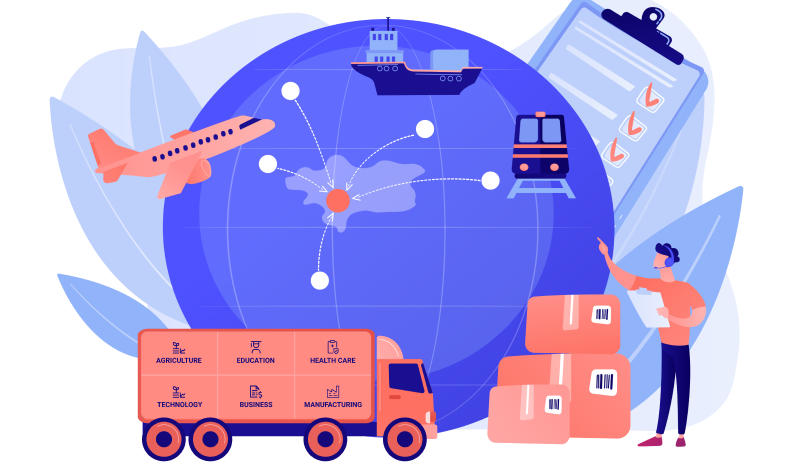The transportation business has a big impact on our lives more than we realize. If you are wondering how to start a transportation business, there are various things to consider before you get started. Our transportation business starting guide can help you define what a trucking business is and will go over everything you need to start your own trucking business.
What is the transportation business?
A transport business is a business that transports goods or passengers from one place to another. They can provide services to individual passengers, other companies or global commercial partners. A transportation business can specialize in a number of activities, including carpooling, transporting consumer goods, or transporting supplies and products internationally. This is one of those commercial businesses where you can work independently and help other companies deliver their goods and services to the actual place of business.

Types of Transport Businesses
In this article, we divide transportation businesses into 3 main categories. Each category may require specific knowledge of state, federal, or even international law to comply. The types of transportation businesses are:
- Personal transportation: This includes services that directly cater to individuals or small groups, including such services as taxi services, carpooling opportunities, and limousines.
- Local Transportation: This category serves the regional market by transporting things like livestock, materials, consumables, etc.
- Global transportation: Global shipping companies include aspects of other categories but internationally. International suppliers can provide sea freight or air freight services.
How to start a transportation business? Step-by-Step guide
Step 1: Decide on a specific niche
When you start a transportation business, the first step involves who and what you will serve. Which niche shall I choose? is a question that needs a response. There are several kinds of transportation firms, as was previously said, and you can simply pick the one you believe would be appropriate. Selecting a field and learning everything you can about it is crucial. If you’re unsure which option to make, look at the supply and demand in your neighborhood.
Step 2: Set up a business model
After you’ve chosen a niche and learned all you can about it, you’ll need to move on to the business model stage. This is when you’ll set up your business structure and start filling in operational information about your business. You can choose between models such as: Sole Proprietorship, Limited Liability Company, or Partnership…
Step 3: Registration tax code
One of the first steps in your trucking journey is setting up a physical business. This means you need a permit from your local or state government. Since the rules vary by location, you should also consult your local government for how to apply for a business license. whereby you need to apply for a federal tax identification number or employer identification number (EIN) before opening your business.

Step 4: Apply for a business license
When you start your transportation service, you need to have the appropriate license. Why do transportation businesses need more licenses than other types of companies? The answer is that in many situations you will be dealing with passengers, people, and other precious goods.
Step 5: Set financial goals
Based on the type of transportation business you choose, the cost can be minimal or large. Do you require a loan to begin? Make sure to have a solid business plan established and on paper, as many lenders will require a review of this plan before considering a new loan application.
Step 6: Choose the right equipment
Choosing the right equipment can help you stay profitable by giving your new business a professional look from day one. Vehicle size and quality matter, especially when you are transporting goods and materials on behalf of others.
Step 7: Incorporate standard recruitment processes
Your company’s recruitment practices may evolve as your organization grows, but you should always incorporate standard recruitment processes into your business plan. This helps to formalize the process and ensures that you are following local and state employment rules.
Step 8: Regular maintenance
While your supplies, vehicles and fleet may be new, long-term use can compromise both safety and quality. How will you maintain routine maintenance to ensure that your customers do not experience any service limitations? In addition to regular checks, you should request the renewal of your certificate and license at different intervals.
The outstanding benefits of business transportation

-
High demand: Transportation services are always in high demand, as people and goods need to be moved from one place to another. They can also easily scale up or down to accommodate changes in demand.
-
Flexibility: Transportation businesses can be tailored to meet specific needs, such as freight, and passenger transport, or specialized services such as medical transportation or transportation for events.
-
Recurring Revenue: Many transportation businesses have regular customers using their services on a recurring basis, providing a steady source of income. As technology continues to evolve, the transportation industry is likely to continue to grow, providing opportunities for businesses to expand and diversify their services.
-
Low startup costs: Many transportation businesses can start with a relatively low initial investment, such as cars and smartphones.
Avoid these Mistakes When Starting a Transportation Company
There are a number of mistakes to avoid when starting a transportation business. First, Ignore the rules of neighboring states and locations. As a transportation business, you may of course need to cross state boundaries or operate in other jurisdictions. Make sure you know the licensing rules and requirements in every state or location where you do business. Second, forget insurance in your business. Accidents can happen to every item you carry, so it’s essential to have insurance to cover those situations. Finally, Do not combine contracts and waivers. A business contract can ensure that you receive payment for services rendered. If you serve passengers, exemptions can protect you legally in the event of a misunderstanding or an accident.
Conclusion
Starting a transportation business can be a rewarding and profitable business venture, but it requires careful planning and execution. Depending on how interested you are as a new business owner in the future, you have a lot of options. In this guide, we’ve detailed the steps on how to plan and start a transportation company from scratch.

